Here’s the first in a series of articles created by you, the readers of MONKEE SPECTACULAR! (See page 36 and find out how you can interview the Monkees!) This month’s guest interviewer is Judy Andrews of St. Louis, Missouri.
Davy Permalink
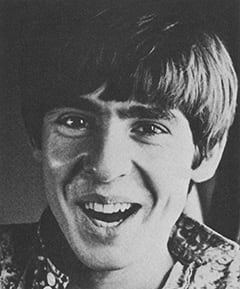
Q. I know your main ambition is to become a star, which actually you have fulfilled, but isn’t there some deep hidden ambition inside you that no one would guess as being a part of Davy Jones?
A. One day I want to go to work on a whaler. I’d like to work there for about three months, just like all the other seamen. Why? Just so I could do a lot of thinking. Because I believe when you work hard you think a lot.
Q. Your advice to St. Louis kids was to get a good education. You have not been able to further yours as of now. Do you plan to finish your education someday and if so, what field do you think you would be interested in as your major.
A. For what I want to do, formal education is not that important to me. I think it’s important for somebody else, because in America you can’t get your foot in the door without going to college. It’s important to the kids in St. Louis, unless they’re going into show business, where you don’t have to have loads of schooling. All you need to know in this business is what to do in front of a camera.
After the Monkees is finished as a TV series, we’ll probably go into making movies as a group. We’ll be making about three movies a year, which will give us a great deal more free time. When that comes, I’d like to take some night classes and study physical fitness. Learning, mind-wise, I’d like to study American history, to know more about the history of the people I’m performing for. I never took much American history in school.
Also, I’d love to take some painting and sculpting and pottery classes, because I really enjoy that sort of thing. But it wouldn’t be fair, because of my name, my paintings would be overrated. If I believed what I was told, I’d only be fooling myself and I don’t want to do that. I have painted some, but I’ve given away everything I’ve done in the past to friends. When you paint or sculpt a piece of art, you can’t put a price on it. A painting may be worth a million dollars, but it’s not unless it has meaning to me. If I really like it, I’ll pay any price for it. However, the most I’ve ever paid for a painting is 50 dollars.
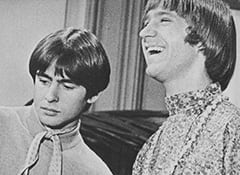
Q. When you boys came to St. Louis, I attended your concert. You all looked like you were enjoying every minute of your performance. As you stand performing (especially when you do your solo number) what goes through your mind?
A. When I’m doing my solo number, the first thing that goes through my mind is that this is the first time the kids have seen me as a single. And for that reason I want to be especially good.
About half way through the show, I think “It’s half way over.” At that point in the show most shows go downhill. But no matter what energy level we’re at, no matter how tired, we know that the second half has to be twice as good, so when you leave at the end of the last song, it’s the peak of excitement.
The excitement builds from the beginning, when the audience sees you for the first time, and that’s really groovy. It’s really a great feeling for us. But, we believe (and we work to make this happen) that the last song should be 40 times better than the first.
Q. Even though you are of our very modern generation, you impress me as being a true Englishman, such as the ones of many years ago. Do you feel you are completely modern or do you feel as I do, that you have retained some of the British chivalry and flattery of years back?
A. I’m very proud to be English. Whether or not I apply for American citizenship (and I hope to apply because I love both countries equally), people constantly remind me I’m English. When people are around me, they play up the fact that I’m English more than I do. One way they do this is to say English expressions to make me feel at home.
Some of my friends imitate the old Cockney expressions like “skin and blister” meaning sister, and I could go on with expressions like that all day.
Another thing is that an English boy comes into contact with the opposite sex at a much earlier age. By this I mean most boys leave school when they’re 15 to work, whereas in America at 15 the boys are still playing baseball in the park. At 15, I was having to talk for myself and make all my own decisions. In England, the boys just begin learning about women early in order to handle them when they become a man at 16 or whatever.
I became a man the day I left home. Then, there was no turning back. I wouldn’t go back until I was a success, no matter what field it was in. To my family, I was successful six years ago when I was in “Oliver.” Now I’m making more money, but I’m also making people happy, just like then, and that’s all I really want to do for the rest of my life. Whether it’s in show business or in some other kind of business, I’ll still apply the little flair of show business to whatever I’m doing to make people happy.
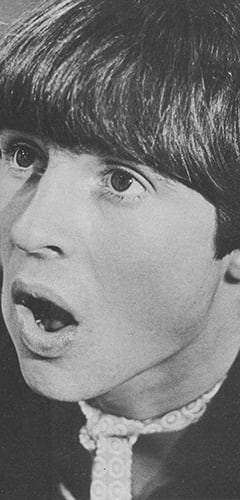
Q. You do not seem to have a complex at all about being shorter than average, which is great. Could you give some pointers to the shorter men of the world so that they could adjust as well as you have?
A. I did have a terrible complex for a long time. That’s why I started to train to be a jockey. I never liked horses. I had never been within five feet of one. But I thought this was about the only thing I could do at my height.
I always felt very hung up about my height. I didn’t date girls for a long time, even when my school friends were taking their girls to the movies. I’m still hung up about it.
The only time I’m not is when I’m performing and it’s groovy because now I’m always performing. Even if I’m not on a stage or in front of the camera, my mind is working—thinking about writing songs and things like that. I’m in a bag now that my height doesn’t matter. My work recently has made me realize that height doesn’t matter.
It also doesn’t matter whether you’re pretty or ugly as long as you know where you’re at and what your thing is. There are a lot of short, ugly men in the world who are household names they are so famous.
My height is no problem anymore. The only time it gives me trouble is when I want to reach something on the top shelf, and there’s no problem with that because I usually have a girlfriend who’s taller than me who can reach it, anyway!
Peter Permalink

Q. I have read that your ambition is to become President of the United States. Why do you want to become President and how do you feel you could best guide our country?
A. I want to become President because it pays better than the salary I’m getting now.
Q. The song you wrote, “For Pete’s Sake” (I think it is great), is about Love. Your motto is “God Is Love.” Would you please explain your own personal feeling about Love and your application of Love to our generation.
A. No. If you can’t dig what I mean from the song, don’t ask. Wait… there’s no difference between loving and being in love. There’s a difference in loving and being in love and being hung up. If you’re in love with someone who isn’t in love with you then that’s just a hang up. That’s not really love because love is totally reciprocated… all the time… real love. If you love a book, it loves you back. If you love a photograph, it loves you—and if you don’t love it, it doesn’t love you and that’s the way it works.
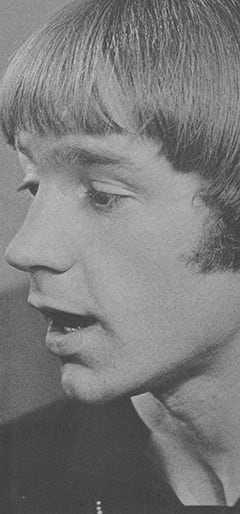
Q. I am a college freshman and I know that furthering my education is very important, but I can’t help but feel that college has a tendency to make a person lose his individuality. You went to college, but did not finish. Is this why you quit and if not, what are your real reasons for dropping out?
A. I didn’t drop out, I flunked out, but I flunked out knowing that I was going to have to leave anyway because my interests were going in other directions. College doesn’t make you lose your individuality, you lose your individuality. You can keep it all by yourself in the desert… or in the middle of the hardest, toughest city in the whole world… or college or any place. It’s up to you to keep your individuality.
Q. You read a book a day. Of all the books you have read, which three are your favorites and why?
A. No, I don’t read a book a day. I sometimes spend weeks on a book. Of all the books I’ve read, my favorites are “The Book Of Toa,” (The Book Of Tao) “Stranger In A Strange Land” and oh, I don’t know, a whole mess of other books, because they turn me on—they get to me.
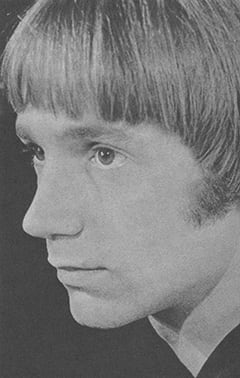
Q. If you had your choice of anywhere (actually you do) in the world to live, settle down, and raise a family, what place would you pick and why?
A. I don’t know. I could say now, but by the time I got to a particular place the conditions will have changed from what they are right now. If this minute everything I’m doing now was all over and I was going to settle down and I didn’t have to be anyplace for years on end, I could settle in Wisconsin, or New Mexico, or Northern California, or Oregon, or Maine, or overseas I could settle in France or Burma.
Q. When you boys came to St. Louis, I attended your concert. While watching you boys, you looked like you were enjoying every minute of your performance. As you stand performing (especially when you do single spots) what goes through your mind?
A. I think about doing a good job… getting in touch with the audience. While the microphone is in my hand, I think about the lyrics of the song I’m doing. I think about keeping it fresh, keeping the performance fresh. More than anything, I think about getting in touch, because that’s so important.


